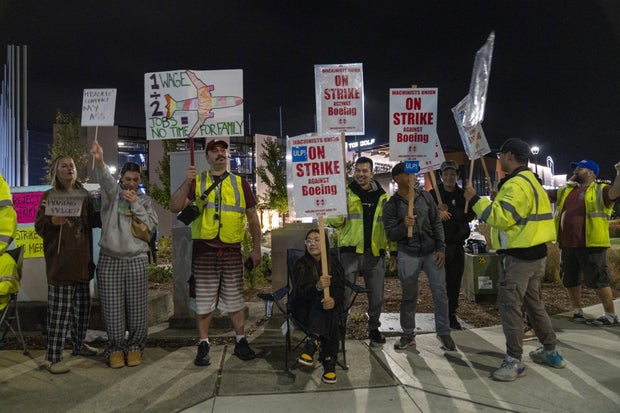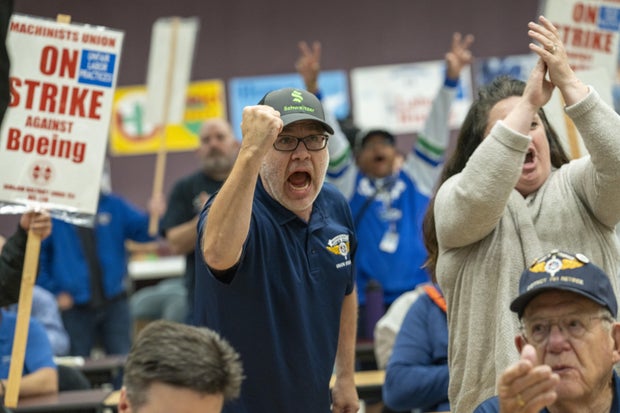Boeing workers went on strike after overwhelmingly voting to reject contract offers and walk off the job
Seattle – Aircraft assembly workers walked off the job early Friday at Boeing factories in Washington, Oregon and California after union members voted overwhelmingly. A temporary rejection Agreement that will increase wages by 25% over four years.
The strike by 33,000 machinists was expected to halt production of Boeing's best-selling airliners, and was another blow to a company already reeling from financial losses and damage to its reputation.
Boeing shares were down 0.3% in midday trading, leaving its stock down about 38% so far this year.
The walkout began at 12:01 a.m. PDT, less than three hours after the local branch of the International Association of Machinists and Aerospace Workers announced that 94.6% of voting workers rejected the proposed contract and 96% approved the work stoppage, easily surpassing the two. – Third requirement.
The strike will not affect commercial flights but represents another blow to the aerospace giant, whose reputation and finances have been battered by manufacturing problems and multiple federal investigations this year.
Striking machinists assemble the 737 Max, Boeing's best-selling jetliner, the 777 or “triple-seven” jet and the 767 cargo plane at factories in Renton and Everett, Washington. The walkout likely won't halt production of the Boeing 787 Dreamliner, which is built by non-union workers in South Carolina.
Bloomberg via M. Scott Brauer / Getty Images
Machinists earn an average of $75,608 per year, not counting overtime, and that will increase to $106,350 at the end of a four-year contract, according to Boeing.
However, the deal fell short of the union's initial demand for a 40% pay increase over three years. The union also wanted to restore traditional pensions that were phased out a decade ago, but settled for increasing Boeing contributions to employee 401(k) retirement accounts.
Outside the Renton factory, people stood with signs saying, “Historic deal my ass” and “Have you seen housing prices?” Car horns blared and a boom box played songs like Twisted Sister's “We're Not Gonna Take It” and Taylor Swift's “Look What You Made Me Do.”
Boeing responded to the strike announcement by saying it was “prepared to return to the table to reach a new agreement.”
“The message was clear that the tentative agreement we reached with IAM leadership is not acceptable to members. We remain committed to restoring our relationship with our employees and the union,” the company said in a statement.
Bloomberg via M. Scott Brauer / Getty Images
This year has rarely gone right for Boeing, for one Blow out the panel And in January NASA left a gaping hole in one of its passenger planes Leaving two astronauts in space Instead of sending them home with problems Boeing Starliner spacecraft.
As long as the strike lasts, it will deprive Boeing of much-needed cash it gets from delivering new planes to airlines. It will be another challenge The new CEO is Kelly Ortbergwho was tasked six weeks ago with turning around a company that has lost more than $25 billion over the past six years and fallen behind European rival Airbus.
Ortberg warned the machinists that the strike vote would jeopardize Boeing's recovery and raise more suspicion about the company in the eyes of its airline customers.
The workers were not in the mood to listen.
Ortberg made a last-ditch effort to avoid a strike, telling mechanics on Wednesday that “no one wins” in a walkout.
“For Boeing, it's no secret that our business is going through a tough time, partly because of our own mistakes in the past,” he said. “Working together, I know we can get back on track, but a strike would jeopardize our shared recovery, further erode trust with our customers and damage our ability to define our future together.”
Thumbs-down from union members behind
Many union members posted complaints about the contract on social media throughout the week. On Thursday, dozens whistled, beat drums and held signs calling for a strike as they marched toward a union hall near Boeing's 737 Max plant in Renton.
“As you can see, integration is here,” says Chase Sparkman, a quality assurance worker. “I'm hoping my union brothers and sisters will stand shoulder to shoulder, hand in hand and let our company know, hey, we deserve more.”
Although the bargaining committee that negotiated the contract recommended ratification, IAM District 751 President John Holden, who announced the results of the vote Thursday night, predicted earlier this week that workers would opt to strike.
Boeing employee Adam Vogel called the 25% increase “a load of crap. We haven't had a raise in 16 years.”
Broderick Conway, another quality assurance worker and 16-year Boeing employee, said the company could afford more.
“Many members are quite upset with our first offer. We are hoping that the second offer is what we are looking for,” he said. “If not … we will continue to strike and stand up for ourselves.”
The head of Boeing's commercial-aircraft business, Stephanie Pope, earlier this week tried to dissuade workers from thinking a strike would result in a better offer.
“We negotiated in absolute good faith with the IAM team representing you and your interests,” he said. “Let me be clear: We did not back down with an eye on a second vote.”
Voting began at 5 a.m. local time at union halls in Washington state, Portland, Oregon and elsewhere.
Widespread impact of the walkout
TD Cowen aerospace analyst Cai von Rumohr said it's realistic, based on the history of strikes at Boeing, to expect a walkout to last until mid-November, when the $150 weekly payment to workers from the union's strike fund may seem less for the holidays. .
Von Rumohr said a prolonged strike would cost Boeing up to $3.5 billion in cash flow because the company receives about 60% of the sales price when it delivers an airplane to a customer.
Union negotiators unanimously recommended that workers approve the tentative agreement reached over the weekend.
Boeing has pledged to build its next new aircraft in the Puget Sound area. That plane — not expected until sometime in the 2030s — will replace the 737 Max. It was a key victory for union leaders, who want to avoid a repeat of Boeing moving production of the Dreamliner from Everett to South Carolina.
IAM District 751 President John Holden told members Monday that the union got what it could in bargaining and recommended ratifying the contract “because we can't guarantee that we can achieve anything more with a strike.”
Many union members, however, are still bitter about previous cuts in pensions, health care and pay.
“They're upset. They have a lot of things they want. I think Boeing understands that and wants to satisfy a fair number of them,” said von Rumohr, an aerospace analyst. “The question is, are they going to do enough?”
CBS Seattle affiliate KIRO-TV reported that, at the press conference Thursday night where he announced the results of the vote, Holden was asked about union members who say the proposed contract is not close to what they were looking for and about union members who expressed concern that the union would Not acting in the best interest.
Holden replied, “Well I know we're acting in their best interest, so you know … we had a contract that we negotiated and we recommended it because of (a) number of important things, but within our system, our members The final say is exactly how it should be… now it's in their hands.”
Boeing's reputation has been tarnished since two 737 Max airliner crashes in 2018 and 2019, killing 346 people. The safety of its products came under renewed scrutiny after a panel of the Max blew off during a flight in January.



